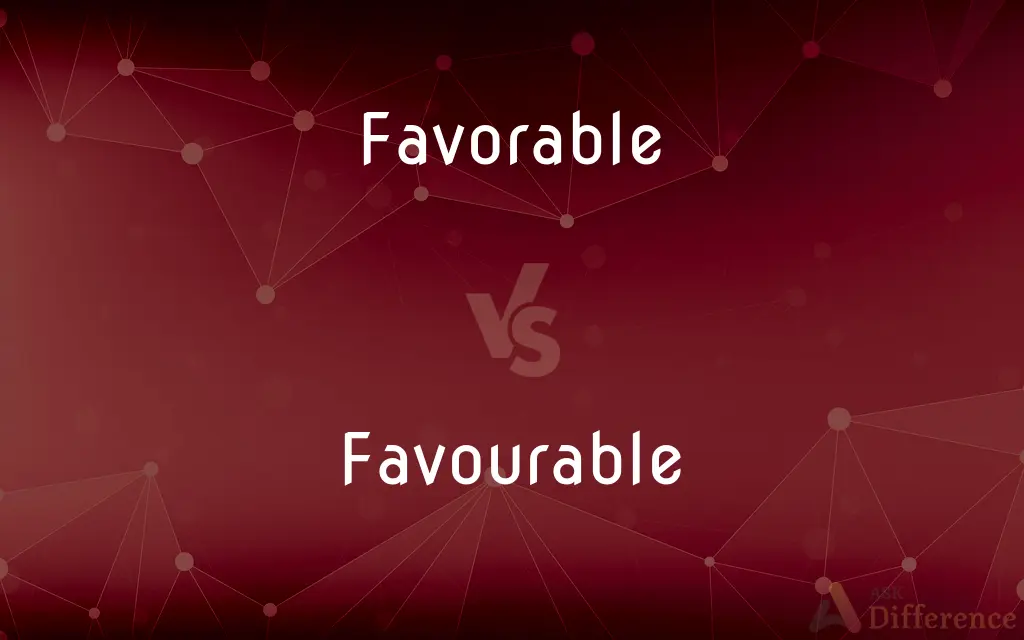Favorable vs. Favourable — What's the Difference?
By Tayyaba Rehman & Fiza Rafique — Updated on April 7, 2024
"Favorable" is the American spelling, indicating approval or support; "Favourable" is the British variant, with the same meaning.

Difference Between Favorable and Favourable
Table of Contents
ADVERTISEMENT
Key Differences
Favorable and favourable both describe conditions, attitudes, or outcomes that are advantageous, beneficial, or supportive. The primary difference between them lies in the spelling, which reflects the American and British English conventions, respectively. "Favorable" is used in American English, where the spelling conventions tend to omit the "u" found in certain words. On the other hand, "Favourable" is the preferred spelling in British English, retaining the "u" that is characteristic of many words shared between British and American English but spelled differently due to regional preferences.
Both terms are used to convey positive judgment or a good chance of success. For instance, in weather reports, a "favorable" or "favourable" forecast might suggest sunny skies or good conditions for an outdoor event. Similarly, in a business context, a "favorable" review in American English and a "favourable" review in British English both indicate positive feedback about a service or product.
The choice between "favorable" and "favourable" often depends on the intended audience or the standard spelling practice of the publication, organization, or region. For example, American companies and media will typically use "favorable," while British counterparts will opt for "favourable." This adherence to regional spelling conventions helps ensure clarity and consistency in communication.
Despite the difference in spelling, the pronunciation of "favorable" and "favourable" is practically identical in both American and British English, with only minor variations in accent and emphasis that do not affect the comprehension of the term.
While one uses "favorable" or "favourable," the intended meaning remains the same, and the choice largely reflects adherence to the spelling norms of American or British English. This flexibility in spelling allows for the term to be universally understood and applied across different English-speaking regions while respecting linguistic traditions.
ADVERTISEMENT
Comparison Chart
Spelling
American English spelling without "u".
British English spelling with "u".
Usage Context
Preferred in American publications and communications.
Preferred in British publications and communications.
Pronunciation
Similar pronunciation to "favourable".
Similar pronunciation to "favorable".
Meaning
Indicates approval, support, or advantageous conditions.
Indicates approval, support, or advantageous conditions.
Application
Used in contexts like weather, reviews, and opportunities.
Used in similar contexts with a preference for British English.
Compare with Definitions
Favorable
Likely to approve or support.
She is in a favorable mood today.
Favourable
Conducive to success.
Conditions are favourable for the garden's growth.
Favorable
Advantageous or beneficial.
We have a favorable position for observing the eclipse.
Favourable
Likely to approve or support.
He is disposed in a favourable manner towards the idea.
Favorable
Indicating approval or support.
The proposal received a favorable response.
Favourable
Advantageous or beneficial.
The wind was in a favourable direction for sailing.
Favorable
Conducive to success.
The market conditions are favorable for launching the new product.
Favourable
Indicating approval or support.
The committee gave a favourable review.
Favorable
Positive or encouraging.
The project's outlook is favorable.
Favourable
Positive or encouraging.
Early results are favourable.
Favorable
Advantageous; helpful
Favorable winds.
Favourable
Expressing approval
The exhibitions received favourable reviews
Favorable
Encouraging; propitious
A favorable diagnosis.
Favourable
To the advantage of someone or something
The settlement was favourable to the unions
Favourable conditions for vegetation growth
Favorable
Manifesting approval; commendatory
A favorable report.
Favourable
Pleasing, encouraging or approving.
The candidate wearing the business suite made a favourable impression.
Favorable
Winning approval; pleasing
A favorable impression.
Favourable
Useful or helpful.
We made quick progress, due to favourable winds.
Favorable
Granting what has been desired or requested
A favorable reply.
Favourable
Convenient or at a suitable time; opportune.
The rain stopped at a favourable time for our tennis match.
Favorable
Indulgent or partial
Listened with a favorable ear.
Favourable
Auspicious or lucky.
She says that she was born under a favourable star.
Favorable
(American spelling) favourable
Favourable
Encouraging or approving or pleasing;
A favorable reply
He received a favorable rating
Listened with a favorable ear
Made a favorable impression
Favorable
Full of favor; favoring; manifesting partiality; kind; propitious; friendly.
Lend favorable ears to our request.
Lord, thou hast been favorable unto thy land.
Favourable
(of winds or weather) tending to promote or facilitate;
The days were fair and the winds were favorable
Favorable
Conducive; contributing; tending to promote or facilitate; advantageous; convenient.
A place very favorable for the making levies of men.
The temper of the climate, favorable to generation, health, and long life.
Favourable
At a convenient or suitable time;
An opportune time to receive guests
Favorable
Beautiful; well-favored.
The favorableness of the present times to all exertions in the cause of liberty.
Favourable
Tending to favor or bring good luck;
Miracles are auspicious accidents
Encouraging omens
A favorable time to ask for a raise
Lucky stars
A prosperous moment to make a decision
Favorable
Very favorable or advantageous;
A golden opportunity
Favorable
Encouraging or approving or pleasing;
A favorable reply
He received a favorable rating
Listened with a favorable ear
Made a favorable impression
Favorable
(of winds or weather) tending to promote or facilitate;
The days were fair and the winds were favorable
Favorable
Favorably disposed; not antagonistic;
A government favorable to our interests
Favorable
Tending to favor or bring good luck;
Miracles are auspicious accidents
Encouraging omens
A favorable time to ask for a raise
Lucky stars
A prosperous moment to make a decision
Favorable
At a convenient or suitable time;
An opportune time to receive guests
Favorable
Granting what has been desired or requested;
A favorable reply
A positive answer
Common Curiosities
Do favorable and favourable mean the same thing?
Yes, both terms refer to conditions, attitudes, or outcomes that are advantageous or supportive.
In which contexts are favorable and favourable used?
Both are used in a variety of contexts, including weather forecasts, business reviews, and situations implying advantageous conditions.
Can both spellings be used interchangeably?
While they can be understood interchangeably, the choice of spelling usually aligns with the regional English convention being followed.
Is there any difference in pronunciation between the two?
The pronunciation is very similar, with only minor variations that do not affect comprehension.
How should one decide which spelling to use?
The choice should be based on the intended audience or the standard spelling practice of the publication or region.
Do these spelling differences impact comprehension in international communications?
No, the meaning of "favorable" and "favourable" is universally understood across English-speaking regions, despite the spelling differences.
Why do American English and British English have different spellings for the same word?
The differences stem from historical spelling conventions and preferences that evolved separately in the U.S. and the U.K.
What is the main difference between favorable and favourable?
The main difference is the spelling: "favorable" is American English, while "favourable" is British English.
Are there tools to help ensure consistent use of American or British spelling?
Yes, most word processors offer language settings that can be adjusted to American or British English to help with spelling consistency.
Can the spelling choice affect SEO or online searchability?
Yes, spelling variations can impact SEO; using the variant most likely to be searched by the target audience can improve visibility.
How can one remember which spelling to use?
A helpful mnemonic might be associating "favorable" with American symbols or themes and "favourable" with British ones, like the Union Jack.
Why is it important to consider regional spelling differences in global communications?
Acknowledging regional spelling differences respects linguistic diversity and can enhance the clarity and effectiveness of communication across different English-speaking regions.
Is one spelling more correct than the other?
Neither spelling is more correct; the choice depends on the dialect of English being used.
Are there similar examples of American vs. British spelling differences?
Yes, other examples include "color" vs. "colour" and "organize" vs. "organise", reflecting the same pattern of American simplification and British retention of traditional spellings.
Does the use of one spelling over the other in a document matter?
Consistency within a document is important for professionalism and clarity; thus, choosing one spelling convention and sticking to it throughout is advisable.
Share Your Discovery

Previous Comparison
Sock vs. Stocking
Next Comparison
Handbag vs. SatchelAuthor Spotlight
Written by
Tayyaba RehmanTayyaba Rehman is a distinguished writer, currently serving as a primary contributor to askdifference.com. As a researcher in semantics and etymology, Tayyaba's passion for the complexity of languages and their distinctions has found a perfect home on the platform. Tayyaba delves into the intricacies of language, distinguishing between commonly confused words and phrases, thereby providing clarity for readers worldwide.
Co-written by
Fiza RafiqueFiza Rafique is a skilled content writer at AskDifference.com, where she meticulously refines and enhances written pieces. Drawing from her vast editorial expertise, Fiza ensures clarity, accuracy, and precision in every article. Passionate about language, she continually seeks to elevate the quality of content for readers worldwide.












































